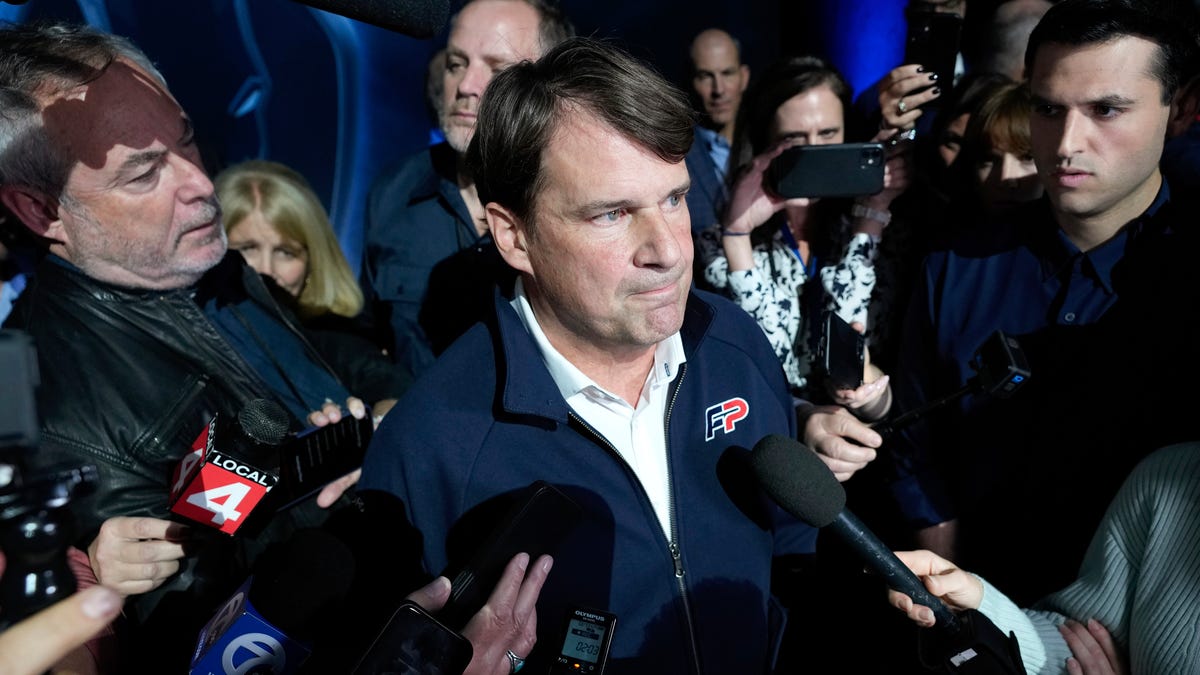Ford CEO: IRA tax credit repeals could risk jobs, Trump tariffs are ‘cost and chaos’

Ford Motor Co. CEO Jim Farley warned that if President Donald Trump repeals provisions of the Biden administration’s Inflation Reduction Act like the electric vehicle battery production tax credits, the company could have to look at layoffs.
“We’ve already sunk capital — even though we’ve rationalized it — in battery production and assembly plants all through Ohio, Michigan, Kentucky and Tennessee,” Farley said Tuesday during a fireside chat covering the “cost and chaos” of the Trump administration’s tariffs approach, Ford’s cost structure and more at the Wolfe Research Auto, Auto Tech and Semiconductor Conference. “And many of those jobs will be at risk if the IRA is repealed.”
The Dearborn automaker is building four battery plants. Three are with its joint venture partner, Korea-based SK On Ltd., in Tennessee and Kentucky representing nearly 11,000 jobs, with the first in Kentucky set to launch this year. A fourth focused on a lower-cost battery chemistry is an entirely Ford-owned plant in south-central Michigan’s Marshall scheduled to open in 2026 and create 1,700 jobs.
Former President Joe Biden signed the IRA into law in 2022 as an economic booster and to spur investment into EVs. In addition to offering up to $7,500 tax credits to buyers of plug-in vehicles, the legislation subsidizes EV battery manufacturing in the United States. Battery cells, which store and release energy needed to power EVs and are the vehicle’s most expensive part, are each eligible for a credit of $35 per kilowatt-hour of energy they can store.
On his first day in office, Trump signed an executive order for the government to consider “the elimination of unfair subsidies and other ill-conceived government-imposed market distortions that favor EVs over other technologies and effectively mandate their purchase by individuals, private businesses, and government entities alike by rendering other types of vehicles unaffordable.”
The production credits represent major savings for automakers and are a key part of Ford’s plans to offer low-cost EVs in the coming years — which are essential, Farley said, to increasing EV adoption.
“We believe that EV demand is still out there, that there is a very underserved group of people on the super affordable where actually running an EV is cheaper than the ICE product,” Farley said, “but these very large EVs that cost $50,000, $60,000, $70,000 — we don’t believe it.”
The Blue Oval last year scrapped plans for an all-electric three-row SUV, saying it would be unprofitable. Its next EV launch will be in 2026 with a commercial van, followed in 2027 with midsize and full-size trucks.
The possible removal of the production tax credits adds to what already has been an expensive and hectic three weeks under Trump, Farley said. The Ford CEO will be visiting Washington, D.C., for the second time in that period.
“They need to understand that there’s a lot of policy uncertainty here,” Farley said. “But in the meantime, we’re scrambling to manage the company as professionals, and we’re in a global race.”
Trump last week paused 25% tariffs on Canada and Mexico until March after striking deals regarding border security and measures to address illegal drug flows. On Monday, he announced 25% tariffs on aluminum and steel, two major material expenses for automakers.
Ford sources 90% of its aluminum and steel from the United States, Chief Financial Officer Sherry House said. But that doesn’t mean it won’t go unscathed.
“Our suppliers have international sources for aluminum and steel, so that price will come through,” Farley said, “and there may be a speculative part of the market where prices come up, because the tariffs are even rumored. So we’ll have to deal with it. And that’s what I’m talking about: cost and chaos. It’s like a little here, a little there, a couple weeks or couple months of vehicles crossing the border, components crossing the border.”
In March 2018, when Trump instituted tariff a 25% tariff on steel and a 10% aluminum duty, Ford said the levies added roughly $1 billion in cost to its operations.
Aside from some inventory adjustments, Ford hasn’t taken any major steps surrounding tariffs, House said, especially when it comes to those threatened on Canada and Mexico; Farley said those have the potential to “blow a hole in the U.S. industry that we have never seen.” He emphasized most of Ford’s vehicles and components are in compliance with the United States-Mexico-Canada trade agreement Trump signed in 2020.
“It gives free rein to South Korean and Japanese and European companies that are bringing one and a half to 2 million vehicles into the U.S. that wouldn’t be subject to those Mexican and Canadian tariffs,” Farley said. “It would be one of the biggest windfalls for those companies ever.”
He added: “President Trump has talked a lot about making our U.S. auto industry stronger, bringing more production here, more innovation in the U.S. And if this administration can achieve that, it would be one of the most signature accomplishments so far.”
bnoble@detroitnews.com
@BreanaCNoble
Related
A top recruiter says sports marketing roles are hot right…
Jobs are opening up in the sports industry as teams expand and money flows into the industry.Excel Search &
Public employees and the private job market: Where will fired…
Fired federal workers are looking at what their futures hold. One question that's come up: Can they find similar salaries and benefits in the private sector?
Mortgage and refinance rates today, March 8, 2025: Rates fall…
After two days of increases, mortgage rates are back down again today. According to Zillow, the average 30-year fixed rate has decreased by four basis points t
U.S. economy adds jobs as federal layoffs and rising unemployment…
Julia Coronado: I think it's too early to say that the U.S. is heading to a recession. Certainly, we have seen the U.S. just continue t










